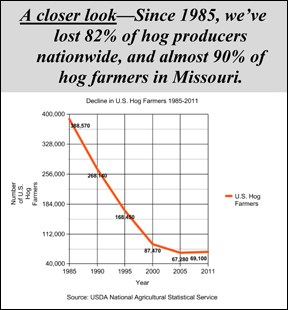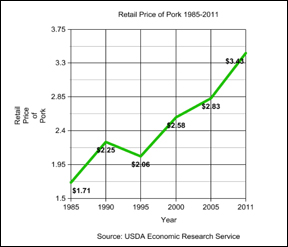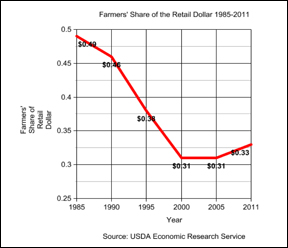|
Our Position --
On Livestock, Rural Communities & the Economy Missouri Rural Crisis Center Colombia, Missouri |
||||||||||||
Introduction In the past 25 years the hog industry has changed radically, providing a prime example of who really benefits when an agricultural industry becomes consolidated and concentrated in the hands of a few corporations. Today most of the hogs in the United States are owned or controlled by enormous factory farm corporations (two-thirds of the hog market is controlled by four meatpackers—Smithfield Foods, Inc., Cargill, Tyson & JBS). The facts show that this type of corporate concentration in agriculture forces farmers to receive less and less of the consumer dollar while driving up consumer prices at the grocery store. As much as corporate ag supporters would like us believe that the industrialization of meat production is inevitable, more efficient and results in cheaper food, it simply isn’t true. Family farmers are still the most efficient producers of livestock, jobs, rural economic development and a healthy environment. From 1985-2011, the retail price of pork has increased 100%, from $1.71 to $3.43. During the same period, the hog producers’ share of the retail dollar has decreased 32% from 49 cents to 33 cents. Changes in the U.S. livestock industry have resulted in corporate meatpackers and retailers increasing their stranglehold over farmers and the marketplace, driving down prices they pay to farmers and increasing the price consumers pay at the grocery store. Independent Family Farms vs. Independent Family Farms -- Family Farmers own their own livestock and make the decisions about their farming operations. -- Family Farmers add to their local communities and economies by spending their money locally. When comparing an equal number of sows on factory farms versus family farms, the family farm system creates: 10% more permanent jobs, a 20% larger increase in local retail sales and a 37% larger increase in local income per capita. -- Missouri has the second highest number of family farms in the country and the VAST MAJORITY of farmers in Missouri are Independent Family Farmers--less than ½ of 1% of farming operations are CAFOs, roughly 500 out of 106,000 farms. Corporate Controlled Agriculture -- Factory farms decrease the property values of surrounding farms and neighbors: According to an Iowa CAFO Study, “an average vacant parcel within three miles of a CAFO in Missouri lost about 6.6% in value, but if a parcel with a house on it was within 1/10 mile of the CAFO, it lost 88% of its value”. -- Corporate CAFOs siphon-off profits for out-of-state investors that do not stay in local communities. -- Livestock housed in corporate CAFOs are typically not owned by the farmer, but instead by corporations. -- Livestock concentration leads to economic decline in rural areas. A study by Food & Water Watch found large hog farm counties in Iowa lost 24% of their small businesses from 1982 to 2007, while the number of small businesses statewide increased 30%. The market share of the top 4 hog processors almost doubled, the number of hogs sold doubled, but the real economic value of hog sales declined by 12%. Choosing the Right Path: A family farm system of livestock production is economically and environmentally superior to industrial production methods. To make this system flourish, measures are needed to level the playing field between family farmers and vertically integrated corporations like Smithfield and Cargill, such as: -- Challenging the corporatization and anti-competitive practices within the livestock industry. Enforce laws that ensure a fair, open, and competitive marketplace for independent family farm producers, including: enforcing current anti-trust laws, banning meatpacker ownership of livestock and labeling imported meat so US consumers can choose to support US livestock producers. -- Stopping taxpayer subsidies to corporate factory farms, including EQIP (Environmental Quality Incentives Program) and USDA loans that fuel the industrialization and vertical integration of the livestock industry. -- Holding factory farm corporations liable for pollution caused by their operations. -- Encouraging public institutions to use their food buying dollars and purchasing power to support family farm produced food. FACT: When independent family farms thrive, so do rural communities & rural economies.
|
||||||||||||
|
Published in In Motion Magazine November 18, 2012 |
||||||||||||
If you have any thoughts on this or would like to contribute to an ongoing discussion in the  What is New? || Affirmative Action || Art Changes || Autonomy: Chiapas - California || Community Images || Education Rights || E-mail, Opinions and Discussion || En español || Essays from Ireland || Global Eyes || Healthcare || Human Rights/Civil Rights || Piri Thomas || Photo of the Week || QA: Interviews || Region || Rural America || Search || Donate || To be notified of new articles || Survey || In Motion Magazine's Store || In Motion Magazine Staff || In Unity Book of Photos || Links Around The World || OneWorld / US || NPC Productions Copyright © 1995-2012 NPC Productions as a compilation. All Rights Reserved. |




